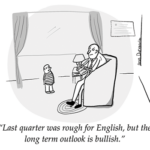Current and former education reporters share their thoughts on education coverage, race in the newsroom, and their own work.
By Alexander Russo
Journalism has been filled with debate and self-reflection these past few weeks — especially on hot-button issues like race in the newsroom and depictions of race in media coverage.
There’s been a smattering of public discussion about these issues within education journalism, including at last week’s Education Writers Association conference.
In the interests of keeping a constructive discussion moving forward, I asked current and former education journalists to reflect on their own newsroom experiences with race, any concerns they may have about how journalists have covered race in education, and any past coverage they now wish they’d done differently.
Some declined, and others wrote long, impassioned responses. There’s nothing comprehensive about the reflections that were shared, which I’ve excerpted below. However, I learned a lot from their insights, and I appreciated their candor. On social media or in some other way, I’m hoping that more education journalists will weigh in on these difficult issues in the weeks ahead.
Some declined, and others wrote long, impassioned responses. I learned a lot from their insights, and I appreciated their candor.
NEWSROOM DIVERSITY
I never personally felt that my stories were directly affected [by lack of diversity in the newsroom], but that doesn’t mean that I didn’t see it happening. There were off-the-cuff comments about Black reporters and Latino reporters, or editors or show people would say, “Can we really trust this person to do a good job?” – Claudio Sanchez (former NPR reporter)
I have seen some great work by ed reporters of all ethnicities over the years. Because understanding the effects of poverty and race are so necessary for us to do our jobs, I don’t see anyone dropping the ball on that. Anyone who spends significant time inside schools, watching teachers and kids in action, knows what is going on and knows what needs reporting. – Jay Mathews (Washington Post)
Our news outlets do a decent job hiring young journalists of color but not retaining them. Especially on the education beat. The problems seem systemic to me. – Beth Hawkins (The 74)
I think that the complicity, in the sense that education journalists are too white, that’s accurate. I don’t think you would solve the problem by simply changing the newsrooms. But that would be a step in the right direction. – John Merrow (former PBS NewsHour reporter)
Almost always, I was the only Black reporter or the only reporter of any color on the education beat. – Anjetta McQueen Thackeray (former education reporter: Associated Press, Education Week)
I never personally felt that my stories were directly affected [by lack of diversity in the newsroom], but that doesn’t mean that I didn’t see it happening. There were off-the-cuff comments about Black reporters and Latino reporters, or editors or show people would say, “Can we really trust this person to do a good job?”
– Claudio Sanchez
APPEALING TO WHITE READERS
When I was an ed reporter, especially in my early years of doing it, I’d say that white, middle-class parents pushed the education news agenda: the mess of applying to middle and high school, coverage of specialized high schools, test scores, etc. … When we covered issues of race and segregation, we attempted to cover those issues wholeheartedly and with vigor. But what concerns me most about our lack of diversity – particularly a lack of Black and Latino or immigrant voices in our newsroom – are all of the other stories that I assume we missed. In my 6+ years on the education beat, I think that our coverage evolved. But we did stories from a mostly white lens, and for a public radio audience that I think we assume is mostly white. – Yasmeen Khan (WNYC public radio)
We always wanted to tell stories that would appeal to parents, particularly outer borough parents, but what that meant was that we tended to view things through a middle-class, white lens. Issues like gifted and talented and social promotion, admissions to the selective high schools like Stuyvesant were big stories. I saw resistance to things that would upset the white, middle -class educational apple cart. It was hard to go after gifted and talented, for example, because so many of our outer borough readers were pretty happy with their gifted and talented programs. –Joe Williams (former Milwaukee Journal Sentinel and NY Daily News reporter)
Overwhelmingly the lens of education coverage is through that of a white, middle class child seeking to navigate college. Children of color stories portrayed them as passive—either as victims or as beneficiaries of some white generosity. – Anjetta McQueen Thackeray
Overwhelmingly the lens of education coverage is through that of a white, middle class child seeking to navigate college. Children of color stories portrayed them as passive—either as victims or as beneficiaries of some white generosity.
– Anjetta McQueen Thackeray
BIAS, OBJECTIVITY, ADVOCACY, & BALANCE
The idea of “objectivity” too often favors those in power. I’ve heard that a few news outlets — and particularly those on the crime and cops beats — are confronting this by rethinking how they use information provided by police officials. Education reporters can do the same thing when it comes to statements from school officials — and I think many, if not all, education reporters scrutinize “official” information. But I think we can do more, and should interrogate bigger picture ideas about what education should look like in the U.S. – Hannah Furfaro (Seattle Times)
Myself, I’ve always thought balance, fairness and transparency are more realistic and useful than the concept of objectivity. It’s well past time to acknowledge that objectivity has too often been used to preserve a white status quo. My community’s news outlets are relentless about including white voices in articles or broadcasts where they are not needed, or often relevant. In discussions particularly with local editors, it often feels as if this is on some level to maintain white readers’ comfort. – Beth Hawkins
Working for the NewsHour, you’re never going to go take a position; everything they do is scrupulously balanced, and that’s fine, that’s a good thing. But I wish I had spent more time thinking about and covering the negative effects of the sorting system that we have in public education. I did some reporting and writing about that, but never forcefully enough to have an impact. — John Merrow
I have been an education reporter in Texas and Washington, DC, covering local and national policies for three different outlets. I naturally gravitated to certain stories. I wrote about Brown v. Board a few times. It was important to me to do so. I did not always get the time and support to do more like this: Deaths of Pivotal Figures in Brown Mark Passing of Desegregation Era. – Anjetta McQueen Thackeray
I ended up doing my best work when I would meet with families where I would say to myself, “There but for the grace of God go I.” But some people would see that as advocacy or bias … There was also the advocacy myth, which held that because you’re brown or African American or Latino that you are trading one for the other, that diversity and neutrality were mutually exclusive. The mistake of seeing the problem as sacrificing quality journalism for diversity, that mindset and remnants of that mindset are still there. And it’s very much part of what we’re going through now. – Claudio Sanchez
My community’s news outlets are relentless about including white voices in articles or broadcasts where they are not needed, or often relevant. In discussions particularly with local editors, it often feels as if this is on some level to maintain white readers’ comfort.
– Beth Hawkins
REGRETS
We had a few [school closings] in Dallas, and they were always framed by the state and district in the context of test scores and “failing” schools, and so that’s the framing our coverage took on as well. I never really understood why a school “failed” or the factors that drove it beyond the race, socio-economic status, and test score data that were presented on its accountability report. I never asked how the city failed the school. I only looked at how the school “failed” the kids. – Kent Fischer (former education reporter at the Dallas Morning News)
I should have not written a story like this: Study: Diversity Squelches Learning. This story was a researcher questioning the efficacy of diversity. It was “unbiased” meaning I did not write what crap it really was. Just because someone says racist things doesn’t mean they should have a clear platform under the guise of equal time. – Anjetta McQueen Thackeray
I do wish we had not spent so much time on school boundary disputes, superintendent searches and budget battles in the old days. I eventually realized those stories had nothing to do with the quality of the schools. We ought to have gone after what was happening in classrooms that raised achievement, particularly among average kids and kids from poor families. – Jay Mathews
I wrote a story in 2015 about a Black teenager in Fresno, California, who had been locked in juvenile hall seven times — the first was when he was 11. Back then, I was relatively early in my career, and was the only education reporter at The Fresno Bee. But looking back, I think I missed an opportunity to tell a bigger story about the systemic reasons that allow children like Chance to be locked up so many times … I think the story could have done more to force education and prison leaders to confront policies and practices that hurt so many Black children. – Hannah Furfaro
I wish I had covered the rezoning on the Upper West Side more heavily from the point of view of black and Latino families. And I wish I had asked myself different questions while on the ed beat when choosing stories or figuring out how to center them.
– Yasmeen Khan
I wish I had woven more historical context into my work. There were people who read my stories in NYC who had battle scars from Ocean Hill-Brownsville and surely understood the role that race played in just about everything in NYC education. They probably wondered why I was skirting the issue. You have a system that is rigged against many, many Black kids and you prominently quote the spokesperson for that rigged system in news stories? That’s pretty messed up, if you think about it. I also wish I had pushed elected officials and community leaders to get real. – Joe Williams
Five years ago, I wrote this interlocking oral history of six Black men whose lives touched one another’s in Twin Cities schools. I was very proud of it at the time. I worked in partnership with a Black, male photographer from Atlanta, Johnny Crawford. Today, however, I don’t think I would do this. The men depicted here seemed pleased with the final product — or at least disinclined to complain — but I think the concept of a white woman narrating the educational experiences of Black men is problematic. It’s not my story to tell, the creative and editorial choices I made “centered” me and my voice and a white woman framing Black men’s school journeys repeats a pattern in our schools, where 96 percent of teachers are white and most of them women. – Beth Hawkins
I wish we had not given such weight in the news to the annual state test score press conference each year. We were already reporting on problems with the tests and the standards they were based on. So I wish we had not covered the rollout of these scores with the weight that we did. In terms of my own big stories, I wish I had covered the rezoning on the Upper West Side more heavily from the point of view of black and Latino families. And I wish I had asked myself different questions while on the ed beat when choosing stories or figuring out how to center them. I would have asked myself: If we knew our audience was mostly black or Latino, or mostly immigrants, would we be covering this issue at all — or covering it in this way? I think if I had asked and answered this question years ago, my education coverage — some of it, at least — would have looked pretty different. – Yasmeen Khan
Related from The Grade:
Covering communities that are not your own; a reporter reflects (Lee Romney)
Why education reporters need antibias training (Issac J. Bailey)
Covering gifted education through an equity lens (Holly Korbey)
Diversity in education journalism 2020; not nearly good enough
Take it from me; reflections on covering a hazing death at a Florida HBCU (Denise Marie Ordway
The media’s role in justifying school police programs
A bold, imperfect start for the Washington Post’s Laura Meckler (Joe Williams)
“Feel-good” story highlights concerns about racial blind spots
ABOUT THE AUTHOR

Alexander Russo
Alexander Russo is founder and editor of The Grade, an award-winning effort to help improve media coverage of education issues. He’s also a Spencer Education Journalism Fellowship winner and a book author. You can reach him at @alexanderrusso.
Visit their website at: https://the-grade.org/











